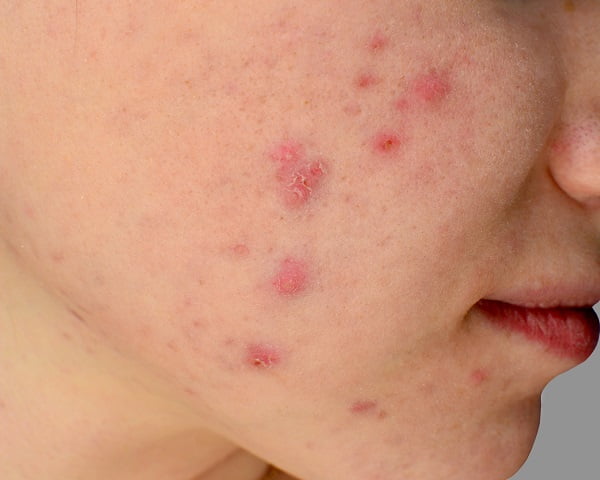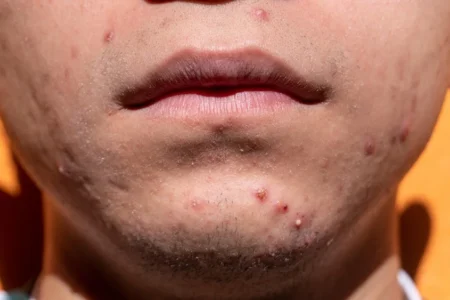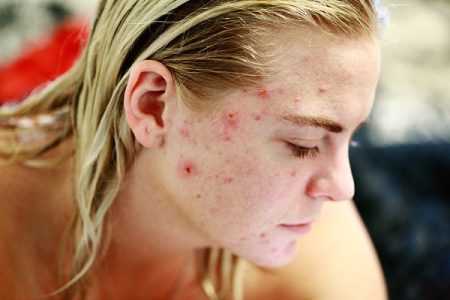Important Facts About Acne One Should Know
- Updated on: Jul 25, 2024
- 5 min Read
- Published on Nov 13, 2018

What is acne?
Acne is a common skin deteriorating condition, also known as acne vulgaris. Acne is an inflammatory skin condition which might be chronic in a few cases. It leads to the formation of pimples or boils, especially on the face, shoulders, back, neck, chest, and upper arms as these areas of skin have the most oil (sebaceous) glands.
Acne generally occurs when hair follicles or pores are blogged with oil and dead skin cells. When body secretes excess oil or sebum, the skin does not dry out and forms clusters of dead skin cells in skin pores. Due to clogging, acne begins to develop and leaves marks and spots on the skin. The lesions in the skin formed by acne include comedones, which can be open or closed plugs that form at the base of hairs.
Acne is more common in young adults or teenagers but there is no age limitation as it is found to affect people of all age groups. Acne often causes whiteheads, blackheads, papules, cysts or pimples, and usually appears on the face, forehead, chest, shoulders, etc.
Another common term for acne is hormonal acne. Although, hormonal acne is not a scientific or medical term but it is used prominently as in most cases acne develops during the hormonal changes of puberty.
Types and severity of acne
Hormonal acne is very common as more than 70% of people of age group 11-30 years are observed to be affected by it. Acne can vary in size, shape, color and severity.
The condition can be classified into three different classes depending upon the level of severity. They are:
Mild acne
Mild acne includes small inflammations which get reduced with time. They are affected by hormonal changes in the body and may not be considered as a chronic problem.
Moderate acne
Moderate acne might both be inflammatory and painful. These lesions leave spots and marks even after they disappear.
Severe acne
Severe acne is a cluster of widespread inflamed lesions. Severe acne leads to the formation of scars and there is a need for proper medication. It affects the appearance of a person and also leads to emotional imbalance. Depending on its severity, acne can lead to scarring and stress. Therefore, quick treatment is necessary.
The common types of recognizable acne are:
White heads
These are small blemishes with whitish “heads,” filled with excess oil or sebum which blocks the pores.
Black heads
They are open pores which are black in appearance as the debris inside the follicle becomes oxidized. Clogged hair pores or follicles, also known as comedones, are also categorized as blackheads.
Papules and Pustules
When whiteheads are infected with the presence of bacteria and leads to inflammation, redness and swelling, they are known as papules. These can be dried out with proper medication. Pustules are a severe version of papules as they are pus filled inflammatory boils. They appear whitish or yellowish and are bigger painful whiteheads. Proper treatment is required to avoid spreading of the infection and formation of scars.
Nodules and cysts
These are capable of causing more severe and permanent damage to the skin if left untreated. They form hard and painful lumps which are clearly visible on skin surface.
Symptoms of hormonal acne
Hormonal acne can be easily recognized depending upon its type and severity. The symptoms of acne are dependent on the severity of the acne. Some common symptoms are:
- Closed plugged pores which appear as whiteheads
- Open plugged pores which are oxidized and appear to be black heads
- Formation of small red, tender bumps
- Pus filled boils which are also supposed to be pimples
- Large, hard and painful boils underneath the skin surface
- Painful, inflamed pus-filled solid lumps which lead to scarring
Possible Causes of Acne
Main factors which result in formation of acne are:
- Excess activity of a type of hormone (androgens): Androgen is a type of hormone and the levels of this hormone rise when adolescence begins. During puberty, excessive production of the hormone testosterone leads to greasy skin as it increases production of sebum. This excess oil leads to clogging of pores and results in skin inflammation. Hair follicles are also clogged by oil and dead skin cells and form boils beneath the skin surface. In women, androgen gets converted into estrogen.
- Bacterial infection in skin can lead to formation of pus filled boils. Sometimes, immune system reacts to the bacteria which lead to formation of acne. Propionibacterium acnes (P. acnes) are bacteria that breathe on the skin and contribute to the infection of pimples
- Other common causes that contribute to the formation of acne are: some medications that contain androgen and lithium or oral contraceptives, use of greasy cosmetics, hormonal imbalance or any changes in both men and women, emotional stress, heredity, menstruation, PCOS (Polycystic ovarian syndrome) in women, etc.
Diagnosis of acne
Doctors diagnose acne by looking into the severity and types of lesions present in the skin. If the cause of acne is suspected to be hormonal imbalance, then the exact reason for imbalance is found for providing accurate treatment. Severe lesions, scarring, improper pigmentation, etc are signs when skin require proper diagnosis and treatment.
Blood tests are sometimes recommended to find the exact reason of formation of acne. Quick treatment should be provided if the boils or pimples start causing irritation or pain or else it can leave scars or spots on the skin
Treatment of acne: How to get rid of hormonal acne?
Hormonal acne treatment work on the parameters such as control the spreading of acne, avoid scarring or other skin diseases and making spots or marks less visible. The best treatment for hormonal acne is dependent on the age of the person, type and severity of the person.
Several medicines are available which not only kill the bacteria but also open pores and reduce excessive oil in the skin. Some of these are listed below:
- Benzoyl peroxide and retinoic acid in creams and gels help in drying out existing pimples and preventing the formation of new ones. It is a property of benzoyl peroxide that it kills acne-causing bacteria.
- Soaps and acne washes contain salicylic acid which helps to prevent pores from getting plugged and reduce excess production of oil.
- Sulfur has a distinctive smell and is used as natural component in some lotions, cleansers, and masks.
- Resorcinol is an uncommon element used to remove dead skin cells.
- Oral or topical antibiotics such as tetracycline, minocycline, erythromycin, doxycycline, etc are given for a short period of time to kill the bacteria that cause pimples and reduce inflammation.
- Women with hormonal acne are recommended to take birth control pills or spironolactone which regulate certain hormones and add to a decrease in excess oil production.
- Certain supplements for hormonal acne are also recommended to improve the skin. Vitamins for hormonal acne are also beneficial to improve the deteriorating skin. For example, Isotretinoin (Accutane) is a vitamin-A-based medication which is used during the treatment of nodular acne.
There are certain therapies a doctor might recommend for the treatment of hormonal acne:
- Lasers and photodynamic therapy: In this therapy, a special light or laser is used to reduce oil production and kill bacteria. It can also be used to reduce scarring.
- Dermabrasion: It helps in removing the top layers of the skin with the help of a rotating brush and is one of the best treatments for removal of scars. Similar to this is another treatment option called microdermabrasion, which is a comparatively a mild treatment for removing dead skin cells and opening clogged pores.
- Chemical peeling: It is a procedure in which repeated applications of a chemical solution, such as salicylic acid, glycolic acid, or retinoic acid are used to help to remove the top layers of the skin. The damaged skin peels off and reveals new and less damaged skin from below. The process done by Dr. Diva Aesthetics can help to improve the open pores and mild acne scarring.
- Steroid injection: They are given in a very few cases as these are helpful in treating nodular and cystic lesions. Steroids provide rapid improvement and reduce the pain.
- Extraction of whiteheads and blackheads is also suggested.
How to treat hormonal acne with modifications in lifestyle?
- Wash and cleansing the affected area avoids the spreading of infection in the nearby unaffected areas.
- Avoid excess use of cosmetics, oily or greasy creams, hairstyling products, etc.
- Avoid exfoliating or use of hard scrubs
- Protecting skin from harsh sunrays, as it may cause irritation.
- Avoid tight fitting clothes
- Eating healthy with minimal sugars
- It is necessary to avoid anxiety and stress, as it can increase production of cortisol and adrenaline, which aggravate acne.












